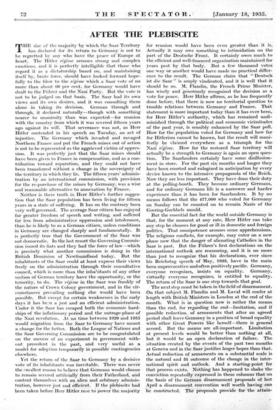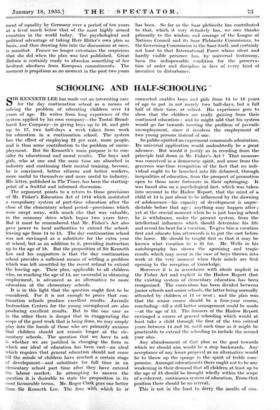AFTER THE PLEBISCITE
THE size of the majority by which. the Saar Territory has declared for its return to Germany is not to be regretted by any who have the peace of Europe at heart.. The Hitler regime arouses strong and complex emotions, and it is perfectly intelligible that those who regard it as a dictatorship based on, and maintaining itself by, brute force, should have looked forward hope- fully to the blow to the regime which a Saar vote of no more than about 60 per cent. for Germany would have dealt to the Fiihrer and the Nazi Party. Mit the vote is not to be judged on that basis. The Saar had its own views and its own desires, and it was consulting them alone in taking its decision. German through and through, it declared naturally—though with something nearer to unanimity than was expected—for reunion with the country from which it was severed fifteen years ago against its will. That severance was not, as Herr Hitler contended in his speech on Tuesday, an act of injustice. The Germany which invaded and ravaged Northern France and put the French mines out of action is not to be represented as the aggrieved victim of oppres- sion. It was perfectly just that the Saar mines should have been given to France in compensation, and as a con- tribution toward reparation, and they could not have been transferred without a change in the sovereignty of the territory in which they lie. The fifteen years' adminis- tration by an international commission, with provision for the re-purchase of the mines by Germany, was a wise and reasonable alternative to annexation by France.
Neither is there truth in Herr Hitler's further sugges- tion that the Saar population has been living for fifteen years in a state of suffering. It has on the contrary been very well governed. The average Saar citizen has enjoyed far greater freedom of speech and writing, and. suffered far less from administrative oppression and intolerance, than he is likely to as a Germari citizen, unless conditions in Germany are changed sharply and fundamentally. It is :Perfectly true that the Government of the Saar was not democratic. In the last resort the Governing Commis-: sion issued its fiats and they had the force of law—which is., precisely what another commission is doing in the British Dominion of Newfoundland today. But the inhabitants of the Saar could at least express their views freely on the administration through their consultative council, which is more than the inhabitants of any other section of German territory have the opportunity, or the temerity, to do. The regime in the Saar was frankly of the nature of Crown Colony goverthnent, and in the cir- cumstances • prevailing nothing else would haVe been possible. But except for certain weakriesies in the early days it has bean a just and an efficient administration. Under it the Saar has escaped both the economic hard- ships of the inflationary period and the outrage-phase of the Nazi revolution. At no time between 1920 and 1935 would migration from the Saar to Germany have meant a change for the better. Both the League of Nations and the Saar Governing Commission are to be congratulated on the success of an experiment in government with- out precedent in the past, and very useful as a model for adoption temporarily in possible` Contingencies elsewhere.
Yet the return of the Saar to Germany by a decisive vote of its inhabitants was inevitable. There was never the smallest reason to believe that Germans would chooSe to remain severed artificially from their Fatherland, and content themselves with an alien and arbitrary adminis- tration, however just and efficient. If the plebiscite had power , been taken before Herr Hitler rose to power the majority for reunion would have been even greater than it is. Actually it may owe something to intimidation on the part of the Deutsche Front. It certainly owes much .to the efficient and well-financed organization maintained for years past by that body. But a few thousand votes one way or another would have made no practical differ- ence to the result. The German claim that " Deutsch ist die Saar " is amply vindicated, and it is well that it should be so. M. Flandin, the French Prime Minister, has wisely and generously recognized the decision as a vote for peace. Herr Hitler affirms, as he has frequently done before, that there is now no territorial question to trouble relations between Germany and France. ThA statement is more important today than it has ever been; for Herr Hitler's authority, which has remained undi- minished through the political and economic vicissitudes of the past year, is sensibly enhanced by the Saar poll. How far the population voted for Germany and how far for Hitlerism cannot be known, but the result will mani- festly be claimed everywhere as a triumph for the Nazi regime. How far the restored Saar territory will actually be a strength to Germany is again an open ques- tion. The Saarlanders certainly have some disillusion- ment in store. For the past six months and longer they have been courted and eulogized in anticipation by every device known to the intensive propaganda of the Reich. Now they are less important. They have done their duty at the polling-booth. They become ordinary Germans, and for ordinary Germans life is a narrower and harder experience than it has been for Saarlanders. It by no means follows that the 477,000 who voted for Germany on Sunday can be counted on to remain Nazis of the Goering-Goebbels mould.
But the essential fact for the world outside Germany is that, for the moment at any rate, Herr Hitler can take any step he chooses for good or ill in domestic and foreign politics. That omnipotence arouses some apprehensions. The religious conflicts, for example, may enter on a new phase now that the danger of alienating Catholics in the Saar is past. But the Ffihrees first declarations on the international outlook are reassuring, and it is no more than just to recognize that his declarations, ever since his Reichstag speech of -May, 1988, have in the main been unprovocative and often positively pacific. Germany, everyone recognizes, insists on equality. Germany, virtually everyone recognizes, is entitled to equality. The return of the Saar is one step towards that goal.
The next step must be taken in the field of disarmament. On that subject M. Flandin and M. Laval will confer at length with British' Ministers in London at the end of the month. What is in question now is rather the means than the end, for regarding the end—limitation, and if possible reduction, of armaments that after an agreed period shall leave Germany in a position of broad equality with other Great Powers like herself—there is general accord. But the means are all-important. Limitation at present levels would be better than nothing at all, but it would be an open declaration of failure. The situation created by the events of the past two months at Geneva and in the Saar justifies larger hopes than that. Actual reduction of armaments on a substantial scale is the natural and fit outcome of the change in the inter- national spirit and outlook. And a starting-point for that process exists. Nothing has happened to shake the conviction repeatedly expressed in these columns that on the basis of the German disarmament proposals of last April a disarmament convention well worth having .c,an be constructed. The proposals provide for the attain- ment of equality by Germany over a period of ten years at a level much below that of the- most highly armed countries in the world today. The psychological and political advantage of taking Herr Hitler's own plan as basis, and thus drawing him into the discussions at once, is manifest. France no longer entertains the suspicions that she did when the plan was first published. Great Britain is certainly ready to abandon something of her hesitant aloofness from European commitments. The moment is propitious as no moment in the past two years has been. So far as the Saar plebiscite has contributed to that, which, it very definitely has, we owe thanks primarily to the wisdom and courage of the League of Nations Council and its Saar Plebiscite Commission, to the Governing Commission in the Saar itself, and certainly not least to that International Force whose silent and hardly visible presence has, by universal testimony, been the indispensable condition for the preserva- tion of order and discipline in face of every kind of incentive to disturbance.







































 Previous page
Previous page